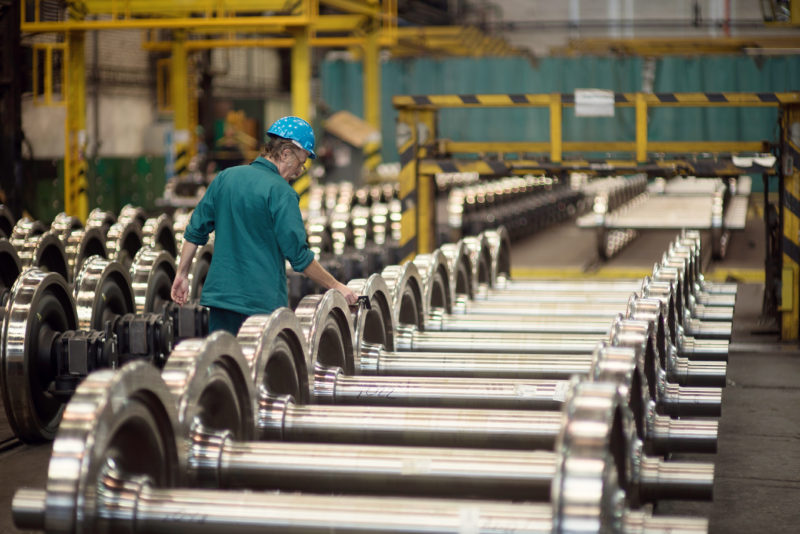Twenty years of the Czech Republic’s membership in the European Union (anniversary falls on May 1, 2024) have brought revenues in the hundreds of billions of Czech crowns (CZK) to businesses in the Czech railway industry associated in ACRI – Czech Railway Industry Association. Since the Czech Republic’s accession to the EU, these companies have been able to triple their turnovers in the markets of the European Union (EU) and the European Economic Area (EEA – Switzerland, Norway, and Liechtenstein), and they intend to pursue further contracts in EU markets. EU membership is not only driving the growth of their exports but also increasing the pace of innovation and the implementation of new technologies in production.
“For the most significant companies in the Czech railway industry, the share of exports to EU markets (or EEA) averages around 80% of production, and many companies are European leaders in their respective fields. Overall, companies in the Czech railway industry generate export revenues to EU and EEA countries of almost 60 billion Czech crowns annually,” says Marie Vopálenská, CEO of ACRI, the Association of Companies in the Czech Railway Industry.
For example, Škoda Group – the Czech leader in the production of rail vehicles – has secured contracts in the EU totaling nearly 120 billion CZK over the last 5 years since 2019 – primarily in Slovakia, Germany, Finland, Latvia, and Estonia. “For example, in Germany, we are the largest supplier of trams with the traditional gauge of 1000 millimeters,” says Tomáš Ignačák, Vice Chairman of the Board and President of the Central and Eastern European regions, adding: “Such a significant volume of contracts would have been practically unattainable without our EU membership.”
Similar results, attributed to the Czech Republic’s EU membership, are reported by BONATRANS in Bohumín, which has become the largest producer of railway wheelsets in Europe. “Our commercial revenues from exports to EU and EEA countries have reached 92 billion CZK over the last twenty years, accounting for approximately 85% of total revenues,” says Jakub Weimann, Chairman of the Board and CEO of BONATRANS GROUP, adding: “For example, when comparing the development of annual export volume to EU and EEA countries in 2003 and twenty years later, we see an absolute increase from 2.4 to 7.2 billion CZK annually – a threefold increase. Thanks to EU membership, we have gained access to significant EU markets, where previously there were local competitors and markets were largely closed to us. This applies, for example, to France or Italy, where our revenues were only 70 million CZK annually before 2004, whereas in recent years, it has been more than ten times that amount.”

Other companies in the railway industry also see the benefits of Czech EU membership, not only in terms of increased revenue and exports but also in standardization of norms and purely in marketing, where the EU brand and image are also keys that open doors to many markets.
This applies, for example, to the Czech company BORCAD, a leader in the production of seats for rail vehicles. Tomáš Boruta, Sales and Marketing Director, says: “EU membership has meant simplification of access to foreign markets for us in terms of business development. I mean especially the removal of trade and time barriers in connection with foreign trade within the EU, but also the improvement of our image thanks to the EU brand in Western markets. EU membership has also brought the implementation of uniform EU regulations and standards, and this standardization has significantly opened or partially opened BORCAD’s access to other markets.”
The growth of the Czech railway industry extends beyond engineering products and components. It includes cutting-edge technologies in the field of security devices, communication, and traffic management from AŽD Praha. An important current topic that AŽD Praha is addressing is also cybersecurity in railways, the importance of which is increasing with the wider use of digital technologies in railway operations. “With our products and technologies, we have also successfully established ourselves in EU markets – for example, in Poland and Hungary, where we are involved in the modernization of key railway infrastructure,” says Zdeněk Chrdle, CEO of AŽD Praha.
Clear benefits of EU membership are also confirmed by other manufacturers and suppliers in the railway industry sector, such as the supplier of security systems Retia or Kontron, the general supplier of GSM-R technologies. For their businesses, the Czech Republic’s accession to the EU twenty years ago provided an impetus for business development, such as simplification of administrative processes in export and import within the EU, mobility, and free movement of people and goods within the EU. “Without EU membership, it would be difficult for us to compete in foreign markets and participate in important tenders,” say representatives of both companies. In a similar vein, ZKL, a leader in the production of rolling bearings, adds that the benefits of EU membership mainly lie in unrestricted movement within the European Union for business representatives and in the fact that the Czech Republic is a member of a customs union.







